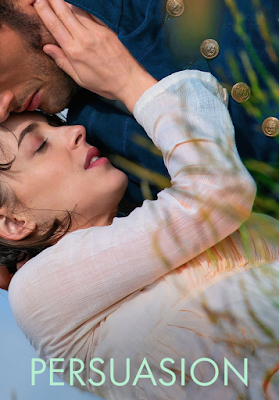Netflix's Take on Jane Austen's Persuasion Pierces My Soul... But Not in Any Good Way
I just died a hundred little deaths, watching Netflix’s take on Jane Austen’s final published work, Persuasion. [And, green eyes looking directly at the camera, “I was not the better for it”.]
As her last completed story, Persuasion has always held a special place in my heart, for it is Austen’s most mature, most serious in tone, and most deeply felt… not only for Ms. Austen, who knew of love and loss, but for discerning readers, everywhere. [If you wanted to go out on a high, you’d make Persuasion your last book.]
[It should be noted that I'm fine with whatever “favorite” Austen tome anyone prefers, for that is not the point, here; the point, if you will, is that her stories—though set in a very specific period (the early 1800s)—have always translated easily, to other generations, other centuries… without the use of special plot devices that change the very tone of her witty, incisive writing.]
Yet, what Netflix gives us today is a mind-numbingly modernized piece, full of cutesy 21st-century tropes, so-obviously-clever-it-hurts dialogue, and inanely-out-of-place behaviors—Fleabag-ian convos breaking the fourth wall, hipster turns of phrase, and so forth—all of which clash harshly with even the commonest of mannerisms embraced during the early-19th-century period, when this tale was penned.
Anne Elliot, as portrayed by Dakota Johnson, could’ve been a compelling character. (I mean, even given the crappy writing and directing, she had a couple of moments.) But instead, her portrayal caused me near-physical pains. Austen’s Anne has genuine regrets, and palpable sadness, over the road not chosen (or at least, not taken). Here, however, we get a beautiful woman [purportedly the “plain” one?!? but, whatever]— who has spent the past eight years, following her bad choice of roads taken—lamenting in bubble baths and over-indulging in wine. [Purists, I kid you not. That’s where this Anne goes.] But, that ridiculousness aside, did I believe she was actually suffering, either because of missing out on marrying her true love, or being stuck with her (still) hopelessly-abominable family? No! I did not… and that is a problem.
And then, we should (briefly) discuss Frederick, as the counterpoint to Anne. Captain Frederick Wentworth, who—eight years previously—had his heart absolutely and irrevocably broken, when Anne was persuaded (by supposedly[?] well-meaning others) to reject his proposal of marriage, due to his lack of fortune or (immediate) prospects? In each of the previous (superior) iterations, the tale’s romantic hero (in 2007’s version, with Rupert Penry-Jones as the stoic Navy man, or 1995’s simply-brilliant Ciarán Hinds, in what will surely go down as the absolute best version, ever), Frederick had strength of character—clearly, a man others would trust, and follow—and capable of the sort of actions that would prove everyone’s trust in him as sound. This Frederick (Cosmo Jarvis), on the other hand, has… well, sort of a desperate look in his eyes, for most of the film’s run time. [Who would follow this man? He doesn’t speak with great authority, nor does he inspire any heroic actions. Instead, he looks… haunted, and hunted. You’d be more apt to confine him to the infirmary than to follow his lead.] And, good looks aside? That ain’t inspiring, y’all.
Yes, there are some very nice location shots. Lovely sets (and set dec). Period costuming is grand. But none of that is what makes a movie!
As for the characters (and relationships, which are important) of Admiral and Mrs. Croft? All but non-existent, here! [No doubt, because they were older characters, and we don’t really tend to care about anyone who isn’t younger and beautiful, in the here and now. Ugh.] I find this gravely problematic, because previous takes on the story featured beautifully-nuanced performances (particularly Fiona Shaw and John Woodvine, as Mrs. and Admiral Croft, in 1995), which added depth and informed much of the subsequent actions in the story.
About the only consistent thing I can name, is the narcissistic Sir Walter Elliot (portrayed, over the years, by Corin Redgrave, Anthony Head, and now, Richard E. Grant). In each case, the actor has gotten an excellent handle on the vain, pompous buffoon of a man which the senior Elliot undoubtedly is. [But seriously, one character done well does not a wonderful telling of this story make!!]
It is occasionally, vaguely, amusing. [I can titter at a set-up like anyone else.] The problem is that the takeaway from Persuasion (in any iteration) shouldn’t be “vaguely amusing”. Like, ever. This is a mature (in tone, in emotion) work of art… with wryly amusing bits, yes(!), and parts that cause you to think… but most of all, full of things that should make your heart feel as though it went through a workout, and emerged, knowing more about itself than it did, previously. [Shorter? You should feel spent and happy, afterward.]
But with this version? I just felt disappointed. Boo.
 |
| (Best thing about this film? My cocktail creation, the "Floral Persuasion".) |
~GlamKitty
[Side note: I'm so frustrated by this one that I'm posting an unedited review. Maybe I'll go back in to fix the typos and nonsense... and maybe I won't, because I'm just so utterly frustrated. There's your verisimilitude, right there, readers...]



Comments
Post a Comment
No ads or shilling, please. And always, always be polite.